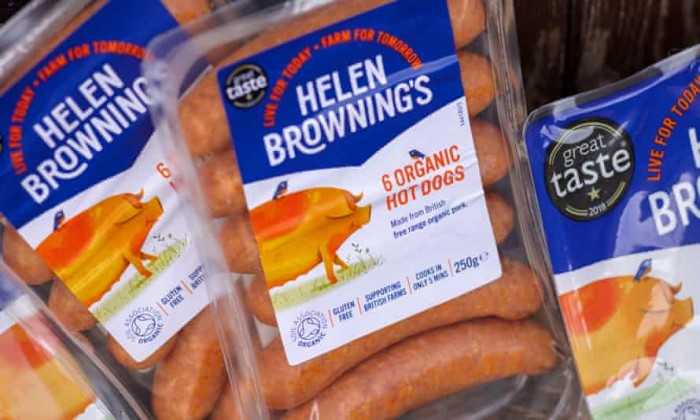UK food company, Helen Browning’s Organic, whose products appear on the shelves of the largest supermarkets in the country has clarified its sourcing policy after a Guardian story suggested it had decided to stop using British pork in their sausages following the post-Brexit complications in moving meat across borders.
Since January, the company has suffered two failed attempts to send British pork to Germany, both of which were held up at French customs for several days and cost the firm £3,500 more to send than in December 2020. The firm behind Helen Browning’s Organic says it has been forced to top up their UK supply with EU pork in order to meet demand and protect their shelf space at the retailers.
The Guardian reported that Vicky McNicholas, the firm’s managing director said , “The cost, the complexity, and the sheer time and effort it takes to manage an export, it’s just not worth it,”.
“This is a huge step to take. We’re all about supporting British farmers. It goes against everything that we want to do. It doesn’t sit comfortably with us,” McNicholas said.
“There is a knock-on effect for us of all these decisions. It’s not as simple as just using EU meat. We have to change packaging and labelling,” she added.
The company have since clarified that when they do move to EU pork in their sausages it will be to top up the UK supply to meet the increased demand for their organic products.
Named after the Wiltshire farmer who founded the business, Helen Browing’s Organic supplies beef and pork products to a selection of Britain’s biggest retailers including Sainsbury’s and Ocado as well as being set to launch at Tesco.
For over 20 years, Helen Browning’s Organics sausages have been manufactured in Germany due to a lack of a suitable factory in the UK. Before Brexit, the trading regulations within the EU meant the firm could easily send pork across borders.
As a result, the company has decided to source some of it’s pork for its sausages in Denmark, but this has already meant the loss of some UK customers, who only sell British meat.
McNicholas added that the move “is not a perfect solution by any imagination and one this time last year I could never have imagined happening. However we feel this is the best course of action to continue producing an organic product, with the benefits this brings, and protect the market place for future generations of organic pig farmers here in the UK”.
The news is likely to come as a further blow for British pig farmers, who have recently been hit with a ‘perfect storm’ following Brexit and Covid-19.




